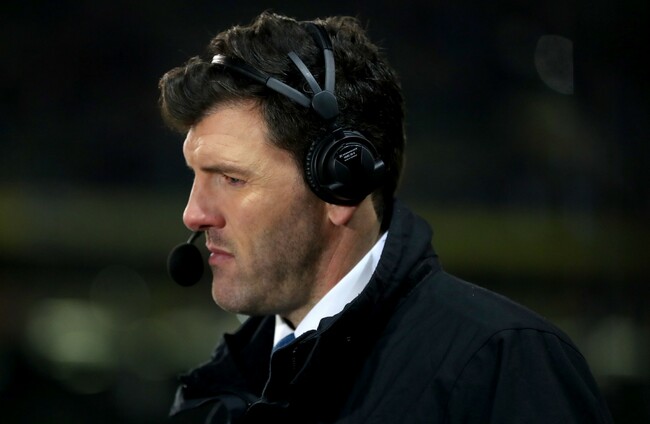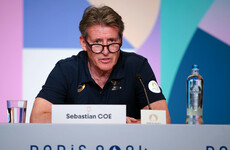SHANE HORGAN HAS said it would be naïve of anyone to think rugby is a drug-free sport.
The former Ireland international delivered his views to Eddie O’Sullivan on his podcast, Eddie’s Edge, tonight. However, Horgan categorically stated that he does not believe there is systematic cheating going on in Ireland.
Asked by O’Sullivan if rugby has ongoing drug issues, Horgan replied: “We would be foolhardy to say there is not. It impacts all other sports. Also if you look at rugby, of all the sports that could benefit, there is a high performance and financial dividend from this one. Combine those two factors –and you could make your career, you could make your life.
I believe there is a systematic problem in South Africa.”
But Horgan does not believe drug-taking exists on an organised basis in Ireland. “We can’t be naïve,” he said. “Testing is one thing but generally dopers will get ahead of the testers. Look at the different sports. Lance Armstrong never failed a drugs test. So we know there is a strong chance cheating goes on.
But take Irish rugby. If there was systematic cheating here, it is one hell of a secret that a lot of people are managing to keep. Ireland is not that big a place. The rugby community is small.
“In any experience I have had, I just don’t feel (widespread cheating is going on in Irish rugby).
“There is a suggestion that this conspiracy of silence exists whereby everyone is afraid to speak up about it. Well everyone would have to be complicit in some way and there are too many honest people working through sport who would not allow this to happen.”
If drugs are one problem, finances are another. Rugby, essentially, is not operating off a sustainable model with very few clubs and even fewer tournaments making money.
“You know the old adage,” Horgan said in his interview with O’Sullivan. “The way you make a small fortune in rugby, you start with a big fortune. The World Cup and the international game drive the finances in rugby.
“Rugby in the UK and France is based on a sugar daddy who wants to have involvement and prestige. That is not a sustainable model for any sport. Too few clubs make money – Exeter do – but rugby does not generate enough money to sustain the squads and the salaries that it are being paid at the moment.
“Rugby is still a minority sport everywhere it is played except for New Zealand or South Africa. In the UK, it is miles behind football. We (he and O’Sullivan) love rugby and it absorbs a lot of our life but in a worldwide context, it is not that big a thing.”
That hasn’t stopped CVC, a private equity firm, buying up chunks of the English Premiership and attempting to muscle in on the Six Nations. Horgan is bitterly opposed to their entrance into the game.
“Let’s see the money they put into the Premiership and where it will go,” he said. “It will be spent on salaries really quickly, I’d imagine, or else it will service debt the clubs are carrying.
“CVC are a profit-making entity. Their endgame is to get the biggest teams to get more games against each other and have deals with the biggest broadcasters or media platforms.
“The biggest danger we are going to see with CVC is what their opinion is with free-to-air rights.
It would be a disaster if the international game went behind a pay-wall. That is not my opinion. That is my assertion. That has been demonstrated through cricket. It went behind a pay-wall. The England team is better than ever but no one is playing cricket.
“The Six Nations holds strength. It is rugby’s promotion to non-rugby followers. Not many sports do that anymore.
It can’t – under any circumstances – sell out to CVC. That would be a disaster.”
The concussion issue is another challenge that, in Horgan’s view, has the potential to have hugely damaging effects on the game.
He told O’Sullivan: “Back in the ‘60s, ‘70s, ‘80s, the violence in rugby games were fierce. It has been cleaned up. Rugby has evolved, maybe not as quickly as it should, but on the concussion point, there is an appetite there for change.
There has to be because this is the crux of whether rugby can continue to exist and be sustainable or not – because if you have kids or young adults who are taking bangs to the head – and it is proven that there are long-term consequences to this then rugby will wither.
“It is about de-risking wherever possible. There is a duty of care around everyone involved in rugby to minimise the risks. So long as risks are managed then you will have a sustainable sport.”
Go to http://www.eddieosullivan.ie/ to listen to Eddie O’Sullivan’s interview with Shane Horgan in full.














If they are…..they need to up the dosage because it’s not doing them much good.
Why is it always South Africa that gets the worst treatment. Surely it happens just as much in NZ , England and probably Ireland as much as it does there???
@Jamie Bent: because as he said its systematic there. The point about Ireland been small is corect. There’s plenty of ex players and crank journalists would would love to be able to break a story about drugs in the irish sides. Maybe at lower levels you might get a player or two but I just can’t see how any of the top professionals would get away with it.
@Jamie Bent: yes it does it’s happened since amatuer days. very little testing so no one knows the extent.
@Jamie Bent: temptation greater in South Africa rugby is a path to high earnings for someone from an impoverished background.
@Chris Mc: ` ex players & crank journalists` are the only ones who will break the omerta surrounding drug use in rugby I assume from your comment, the rest of the rugby pundits are merely PR for the IRFU, that figures.
@Jamie Bent: there js a picture of the South Africa team a few months ago and the props have 6 packs and everyone is a bit too big and strong to be true
Horgan reeeaaaallly liked what the lads were telling him in that photo.
Steroids are a factor in rugby . You only have to listen to the Irish lads mention “genetics “ during the World Cup and around certain games where we have played and been beaten up physically . We all know what they were talking about .
Be naive to think there are not Irish lads at it also but you can tell just by looking at physiques that is definitely more rampant in other countries than here.
Lance failed a good few drug tests. Just had them covered up by the powers that be.
De-risk rugby by getting rid of the “finishers” bench.
Read Stephen Ferris’ autobiography if you want an insight into “supplement” use.
Biggest problem with drugs in rugby today is whoever is dealing to the IRFU players..it’s farcical! 100% duds !
It’s riddled. No one can take that punishment off men who are 17-19 stone running full belt into you every game. It’s being kept quiet because it’s so small in Ireland. The posh elite are very good at keeping secrets
Here we go..
Most are taking HGH that’s a fact.
I’m afraid it’s all about Shane………… again
Rugby is grand, try the travellers in the story above .
Six Nations is off, what can we talk about to stir the pot and create some controversy?